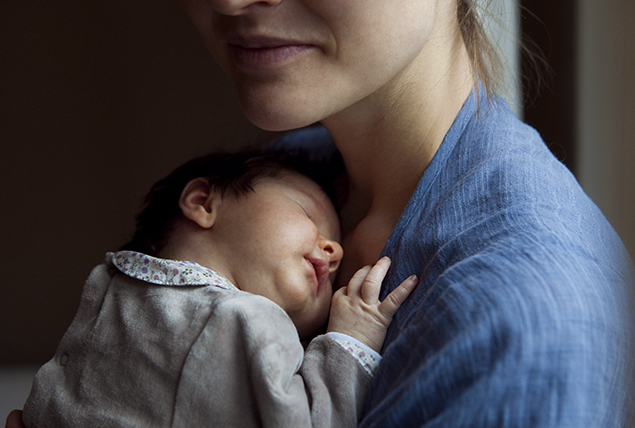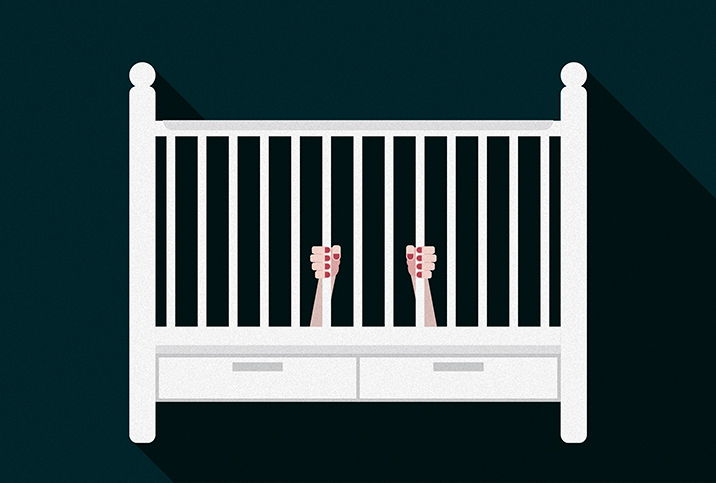Help Wanted: Transitioning Into Postpartum Life Can Be Difficult

The hours, days and weeks after birth are an intense transitional period in any new parent's life, which is why it is so vital to look after yourself as well as your baby during this pivotal time.
It is such an important period that the American College of Obstetricians and Gynecologists (ACOG) has outlined its guidance on the first three months of parenthood, sometimes called "the fourth trimester." It states that "in addition to being a time of joy and excitement, this 'fourth trimester' can present considerable challenges for women."
ACOG recognizes the following issues during this time:
- Lack of sleep
- Fatigue
- Pain
- Breastfeeding problems
- Stress
- New or exacerbated mental health disorders
- Loss of sexual desire
- Incontinence
"Childbirth is physically and emotionally demanding for any patient," said Hector Chapa, M.D., a board-certified OB-GYN and clinical assistant professor at the Texas A&M University School of Medicine in College Station.
He said that while recovery times differ from person to person, it is important for all parents to take time to bond with their child, spend time with family and recover, as well as enjoy this interval as much as possible.
In general, a vaginal delivery has a faster healing time because a C-section involves surgery, which has a greater impact on the body. Many women experience some form of birth injury, and up to 45 percent of new mothers report that they experience birth trauma.
Chapa said a healthcare provider can check for these injuries during and after delivery. However, if a woman has a home birth or misses an examination of the birth canal for any reason, they can request an exam if any problems—such as abnormal bleeding—are suspected. He added that larger lacerations are stitched up and smaller ones heal by themselves given a little time.
"It definitely takes time for the body to 'undo' all of the changes that occur during the pregnancy," Chapa continued.
He cited the example of uterine cramps after birth, also known as nursing cramps or afterpains. The purpose behind these cramps is to shrink the uterus back to its usual size, and they can last for a few weeks after delivery. Breastfeeding releases oxytocin ("the love hormone" that is also released during labor), which can make these pains stronger.
It is important to remember that breastfeeding in itself can cause discomfort, especially as breasts can become engorged when milk comes in around two to four days after birth. Prior to this, the breasts produce colostrum, a golden-colored liquid that is rich in antibodies for newborns.
Chapa explained that if breasts are not emptied often enough, they can become overly full until your milk supply stabilizes. It is also important to look out for blocked ducts or nipple trauma because both can lead to mastitis, a breast infection that may require antibiotics. For any breastfeeding problems or questions, speak to a lactation consultant, who can come up with a plan to assist you in reaching your feeding goals.
"If breastfeeding is not chosen, breast binders or cold compresses can help relieve some of the discomfort until milk production naturally slows," he said.
Aside from the breasts and uterus, the vagina and the areas around it can be sore from bruising and tears, with the level of pain varying from woman to woman. Chapa advised that over-the-counter topical medications and anesthetics, such as lidocaine sprays or gels, can numb the region and relieve pain.
In terms of having sex again, he advised that it can occur whenever the woman is ready but to wait at least two weeks after the baby is born as the risk of infection is elevated during this time.
Problems to be vigilant for post-birth are those that signify high blood pressure (preeclampsia), hemorrhage, deep vein thrombosis (DVT) or pulmonary embolism, especially in the first two weeks.
Chapa advised parents to look out for the following symptoms:
- Persistent headache
- High blood pressure (routinely greater than 140/90)
- Pain in the legs or calves
- Chest pain or difficulty breathing
- Unusual swelling
- Heavy bleeding from the vagina
Of equal importance is your mental and emotional well-being, he stressed. While hormonal changes and physical exhaustion can lead to the "baby blues" in the weeks after birth, it is important to seek help if you are feeling low beyond that time and don't feel like yourself.
The symptoms of postpartum depression (PPD), according to the United Kingdom's National Health Service, can include:
- Sadness
- Tearfulness
- Irritability
- Agitation
- Loss of pleasure in activities you used to enjoy
- Tiredness and lack of energy
- Sleeping problems
- Difficulty concentrating
- Loss of appetite
- Feeling negative about your ability to be a "good mother"
- Feelings of guilt
- Struggling to bond with your baby
Postpartum anxiety can be a problem instead of—or along with—postpartum depression.
"A degree of anxiety is very normal after giving birth as you're undergoing big hormonal and life changes," assured Juulia Karlstedt, M.A., Pg.D., an accredited counselor and therapist at Anxiety Counselling Online, based in Edinburgh, Scotland.
If your anxiety becomes persistent and all-consuming, then it may be postpartum anxiety.
Karlstedt advised parents to look out for the following symptoms:
- Altering your behavior to try to avoid feeling anxiety
- Not leaving your baby's side even if they are with a caregiver or your spouse
- Feeling unable to leave the house
- Engaging in excessive checking and reassurance seeking
- Racing thoughts
- Reparative thoughts that feel intrusive
- A sense that something terrible will happen
- Elevated heart rate
- Labored breathing
She stressed that anxiety presents differently for each person, therefore, it is vital to talk through any issues with your health team so it can come up with a care plan for you.
Chapa also highlighted the importance of good social and emotional support at this critical time, as well as eating and drinking well and getting as much rest as you can.
He added that it is important to be vigilant for changes in your health throughout the entire first year after childbirth, because postpartum depression can present and be diagnosed for up to one year after the baby is born.
While you may receive significant support during the initial weeks post-delivery, the transition into parenthood can be incremental and last as long as your child's infancy. Seeking help when you need it not only benefits you but also your child, as a happier parent can mean a happier baby.


















